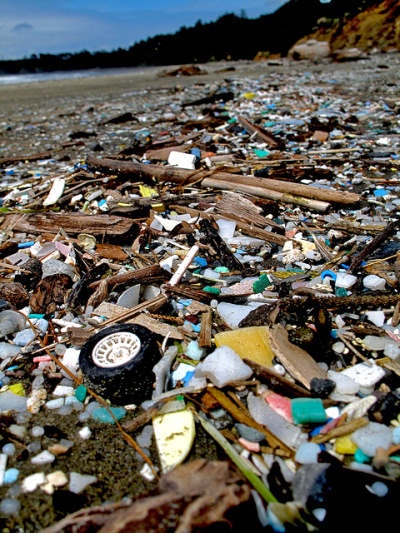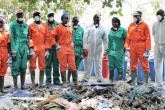More overseas waste aid needed to combat ocean plastics, says CIWM
Plastic in the world’s oceans is inextricably linked to poor waste management in developing countries, according to a report from the Chartered Institute of Wastes Management (CIWM) and WasteAid UK, a charity which develops teachable solutions for communities with inadequate or inexistent waste systems.
 The partnership is calling for the UK government to increase its overseas spending on waste management projects and lead global negotiations on a marine plastics treaty with prevention at its core.
The partnership is calling for the UK government to increase its overseas spending on waste management projects and lead global negotiations on a marine plastics treaty with prevention at its core.
Released today (22 March), the report, titled ‘From the Land to the Sea’, coincides with World Water Day, a day of action and discussion around the importance of safe water to human life and the natural environment. Public awareness of marine pollution is at the highest it has ever been, and the effect of our waste on the planet’s most abundant natural resource is becoming clearer every day.
According to the UN, around eight million tonnes of plastic ends up in the oceans every year, and a major study on the state of the world’s oceans revealed yesterday that this amount could triple in ten years unless serious action is taken. This alarming prediction comes from a Foresight report on the ‘Future of the sea’, produced by the Government Office for Science to advise policy-makers.
Commenting on the CIWM report, the group’s Chief Executive, Dr Colin Church, said: “The figures speak for themselves. More than 90 per cent of marine plastics come from land-based sources. Overall, mismanaged municipal solid waste in developing countries could account for 50 to 70 per cent by weight of the plastics entering the oceans.”
Information from the Helmholtz Centre for Environmental Research (HCER) in October 2017 revealed that 88 to 92 per cent of all plastic entering the marine environment comes from ten rivers in Africa and Asia, with eight out of the ten rivers located in South and Southeast Asia, in rapidly urbanising regions where population growth, and thus plastic consumption, outstrips waste management capacities.
Read more - Ocean plastics: Selling our oceans down the river
There is also an added pressure on these countries created by the amount of waste imported from Europe and America; before China introduced a ban on the import of 24 grades of solid waste, the UK was exporting around 494,000 tonnes of plastics and 1.4 million tonnes of recovered paper there every year, and has now stepped up waste exports to Turkey, Taiwan, Vietnam and Malaysia in a bid to find alternative destinations for these waste streams.
Today’s report claims that two thirds of households in lower income countries have no access to waste collection services at all, leading to serious health risks as well as environmental damage. Last year CIWM commissioned a toolkit from WasteAid UK for community waste management in low and middle income countries; launched in October 2017, the ‘Making Waste Work’ toolkit contains essential skills and techniques to help communities recycle up to 80 per cent of their waste.
Mike Webster, CEO of WasteAid UK and winner of Resource’s Hot 100 2018 list of influencers in the waste and resources sector, said: “These communities need support from the ground up. Simple waste management brings major improvements to people’s lives and the essential waste management skills and recycling techniques we share in the Making Waste Work toolkit can help a typical community to recycle up to eighty per cent of its waste.
“With support from the UK and Commonwealth governments, and the international aid and donor communities, we can make a very real difference.”
 In order to make that difference, CIWM and WasteAid have called on the government to:
In order to make that difference, CIWM and WasteAid have called on the government to:
- Increase the proportion of aid spent on waste management from 0.3 per cent to at least three per cent;
- Champion the need for such increases at the Commonwealth Heads of Government Meeting and the G7 meeting between the world’s largest economies; and
- Spearhead negotiations for a binding international treaty to tackle marine plastics pollution, which should have at its core a focus on prevention of plastic pollution through proper solid waste management.
The report claims that these proposals could potentially halve the amount of plastic waste entering the oceans. Church described the proposals as a “win-win opportunity”, which as well as helping to tackle the marine plastics would “provide a vital service to some of the world’s poorest communities, helping them to have a healthier place in which to live, grow and do business, whilst also creating jobs.”
The full report, ‘From the Land to the Sea’, can be read on the CIWM website.







